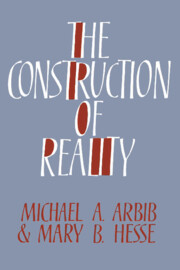Book contents
- Frontmatter
- Contents
- Preface
- Chapter 1 Posing the problem
- Chapter 2 The intelligence of the artificial
- Chapter 3 Schema theory
- Chapter 4 Relating mind and brain
- Chapter 5 Freedom
- Chapter 6 Freud on psychology and religion
- Chapter 7 Schemas: from the individual to the social
- Chapter 8 Language, metaphor, and a new epistemology
- Chapter 9 Interpretation and reality
- Chapter 10 Religions as social schemas
- Chapter 11 The Great Schema
- Chapter 12 Secular schemas
- References
- Author index
- Subject index
Chapter 2 - The intelligence of the artificial
Published online by Cambridge University Press: 22 September 2009
- Frontmatter
- Contents
- Preface
- Chapter 1 Posing the problem
- Chapter 2 The intelligence of the artificial
- Chapter 3 Schema theory
- Chapter 4 Relating mind and brain
- Chapter 5 Freedom
- Chapter 6 Freud on psychology and religion
- Chapter 7 Schemas: from the individual to the social
- Chapter 8 Language, metaphor, and a new epistemology
- Chapter 9 Interpretation and reality
- Chapter 10 Religions as social schemas
- Chapter 11 The Great Schema
- Chapter 12 Secular schemas
- References
- Author index
- Subject index
Summary
This chapter examines artificial intelligence (AI) – the dimension of cognitive science that focuses on programming computers to exhibit aspects of intelligence, without necessary regard for the constraints of human behavior (cognitive psychology) or of brain function (brain theory). We suggest that the achievements of AI to date are limited, but we deny that these are limitations in principle. Nonetheless, we argue that much of what is human about intelligence depends on our being embodied within human bodies and being members of human societies.
In this chapter, we distinguish formal systems in which words are related only to other words within a closed system from systems in which symbols are linked to action “in the world.” We then argue that Gödel's incompleteness theorem does not prove that machines cannot be intelligent, but rather that an intelligent machine must learn, and that some element of inconsistency is an inescapable facet of intelligence, whether in human being or machine. In the next chapter, we see the view of The Construction of Reality Piaget offers in his study of assimilation and accommodation in the child. We then build on Piaget's insights and work in brain theory and artificial intelligence to outline a schema theory that provides our bridge from cognitive science to epistemology.
- Type
- Chapter
- Information
- The Construction of Reality , pp. 24 - 41Publisher: Cambridge University PressPrint publication year: 1986



